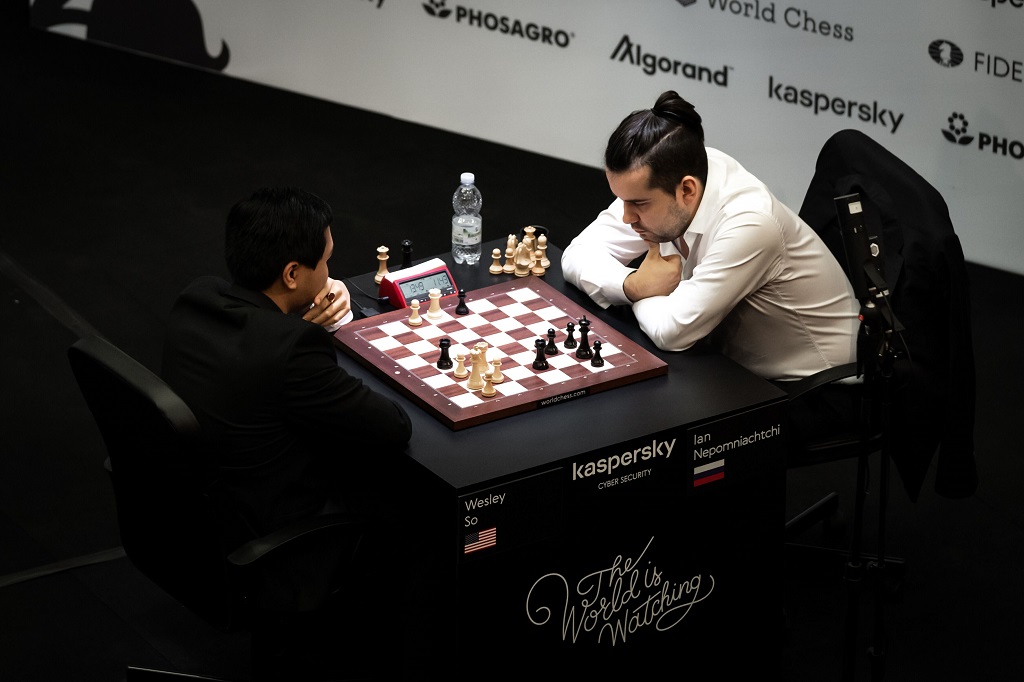


ChessBase 17 - Mega package - Edition 2024
It is the program of choice for anyone who loves the game and wants to know more about it. Start your personal success story with ChessBase and enjoy the game even more.
 The fourth leg of the FIDE Grand Prix is being played in Jerusalem, Israel. The 16-player knockout has a €130,000 prize fund, with the series as a whole having an additional prize fund of €280,000 plus two qualifying spots for the 2020 Candidates Tournament. The tournament takes place in the Notre Dame of Jerusalem Centre from December 11th to 23rd.
The fourth leg of the FIDE Grand Prix is being played in Jerusalem, Israel. The 16-player knockout has a €130,000 prize fund, with the series as a whole having an additional prize fund of €280,000 plus two qualifying spots for the 2020 Candidates Tournament. The tournament takes place in the Notre Dame of Jerusalem Centre from December 11th to 23rd.
The wins obtained by Maxime Vachier-Lagrave and Ian Nepomniachtchi on Monday left them as the only contenders to get the remaining ticket to the Candidates provided by the Grand Prix. Both players needed only two rapid games to beat Dmitry Andreikin and Wesley So, respectively, and will meet in a deciding semi-final face-off. If 'MVL' wins the match, he will secure his spot in the Candidates, while if Nepomniachtchi prevails he will need to also win the final to overcome the Frenchman in the GP standings table.
It must be added that if Nepomniachtchi loses and gets third place in the overall standings, he will most likely face Kirill Alekseenko in a direct match to decide who gets the wildcard offered by the Russian Chess Federation. Thus, beating So was a particularly important step forward for the world number nine.
Meanwhile, in the longest match-up of the day, Wei Yi got the better of Sergey Karjakin, who lost and bounced back in the first set of rapid games, but could not pull the same trick twice.
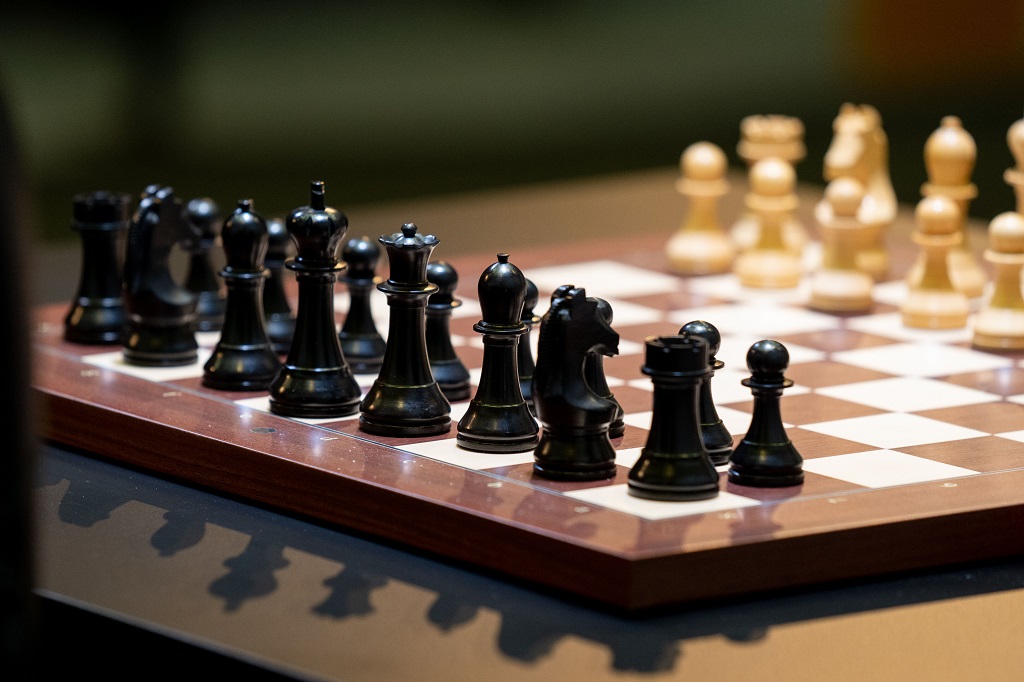
A good-looking close-up | Photo: Niki Riga
The first one to get White in the tiebreaks was Andreikin, and the Russian took drastic measures to avoid delving into a long theoretical line of the Classical Najdorf — after 1.e4 c5 2.♘c3 d6 3.♘ge2 ♞f6, Andreikin played 4.h3 instead of 4.d4. Vachier-Lagrave seemed surprised by his opponent's choice, as he spent almost three minutes on 4...e5, simply strengthening the centre.
The game continued 5.d3 ♞c6, to which Andreikin responded by going directly for the throat with 6.g4. Peter Svidler joined Evgeny Miroshnichenko as commentator and mentioned that Vachier-Lagrave's play from this point on was a direct attempt to refute Andreikin's bold strategy.
Andreikin gave up a pawn for the initiative and, in the midst of the complications, Vachier-Lagrave faltered by allowing his rival to dangerously push his f-pawn up to the fifth rank. A couple of moves later, however, the Russian failed to find a move that would have maintained his advantage:
A dangerous Anti-Sicilian: 1.e4 c5 2.Nf3 e6 3.g3!
Play like Carlsen, avoid theory but without being passive or losing the initiative.
Svidler and Miroshnichenko simply could not understand why Andreikin went for 18.♗e3 instead of the straightforward 18.♖xh5. Capturing the pawn would have led to simplifications and, although White would end up a pawn down, his bishop pair and safer king would give him great winning chances.
Vachier-Lagrave later told Anastasiya Karlovich that he had not reacted well to Andreikin's opening strategy, but he nonetheless "created a mess", generating a situation in which he feels more at home than many other top grandmasters. By move 24, he was in the driver's seat, and when his rook infiltrated on the g-file the white king was all but doomed:
'MVL' sealed the victory with 24...♜h3+ 25.♔g1 ♜g8+ 26.♔f2 ♜g2+ 27.♔e1 ♛a5+ 28.♖b4 ♜xa2. The complex Najdorf had been avoided, but that was not enough to defeat the French tactical beast.
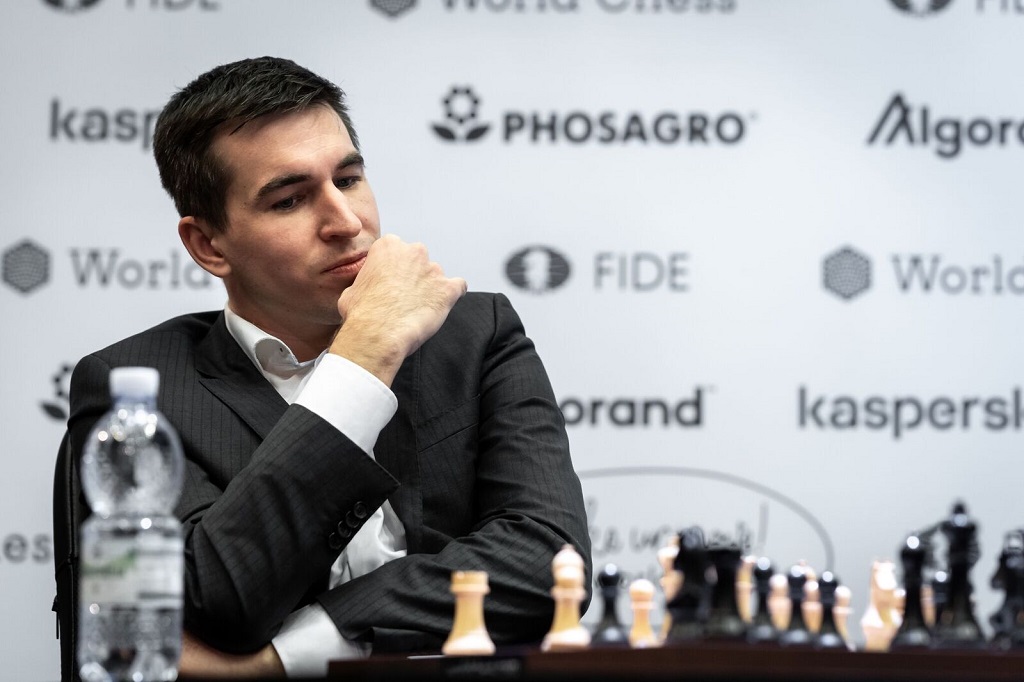
Dmitry Andreikin bravely looked for complications | Photo: Niki Riga
In game two, Andreikin needed a win with Black to bounce back, and once again managed to muddy the waters in order to get some chances. Vachier-Lagrave, in turn, showed his tactical alertness to keep the opposite forces at bay while creating counter-chances on the kingside. When the draw was agreed on move 57, the Frenchman had a clearly winning position.
Talking about his chances to reach the Candidates, Vachier-Lagrave stated:
Of course, it's better for me to win now [against Nepomniachtchi]. I mean, it's a decisive match — if I win, I'm in; if I lose and Ian wins [the event], he's in. So definitely it feels like the final to qualify for the Candidates.
As we are used to by now, the only rest day at the GP events takes place before the final, so there is no break for the players before the aforementioned deciding match-up.
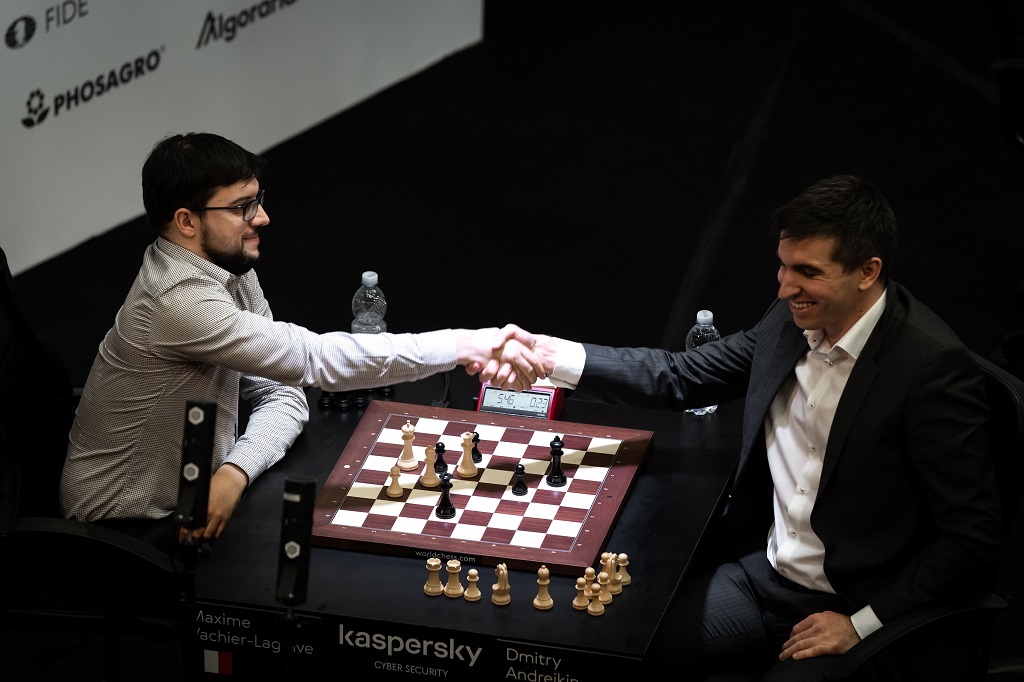
The agreed draw gave Vachier-Lagrave the ticket to the semis | Photo: Niki Riga
Opening preparation was a key factor in this match-up. In game one of the tiebreaks, Nepomniachtchi demonstrated he knew how to neutralize White's slim chances out of the opening, despite having been surprised by So's approach. A draw was agreed on move 45, and now it was the Russian's turn to try his chances with the white pieces.
When being interviewed about game two, Nepomniachtchi confessed that only "once in a blue moon" he manages to get something out of the opening. Fortunately for him, though, the strange occurrence was seen when the stakes were the highest:
The Ruy Lopez Breyer Variation
Pavel Eljanov explains in depth what Gyula Breyer already saw in 1911 and what became an opening choice of the likes of Kasparov, Kramnik, Anand or Carlsen. The Breyer Variation, which is characterised by the knight retreat to b8.
The Russian explained that Black's 21...♝xf3 is a mistake, as after 22.♖xf3, capturing with 22...♜xe5 fails to 23.♖xf7 d5 24.♕xc5 ♛xf7 25.f4:
The key here is that after 25...♛xf4 26.♗xd5+ ♚h8 27.♖f1 Black is forced to play 27...♜xd5 due to the weakness of Black's back rank. Nepomniachtchi had this idea prepared for quite a while, which prompted So to lament his bad luck, stating that "[after f4] it's almost impossible to defend".
Nepomniachtchi did not convert his edge swiftly, however. So was clearly under pressure, but it was his blunder on move 37 which gave the game away:
So's 37...♜d4 allowed the forcing 38.♖e8 ♜xe4 39.♖xf8, when the rook endgame is highly favourable for White. There followed 39...♚h7 40.♖f5 ♜e2 41.♖c5 and the white rook could not be better placed. So kept on fighting, but he finally had to give up on move 65.
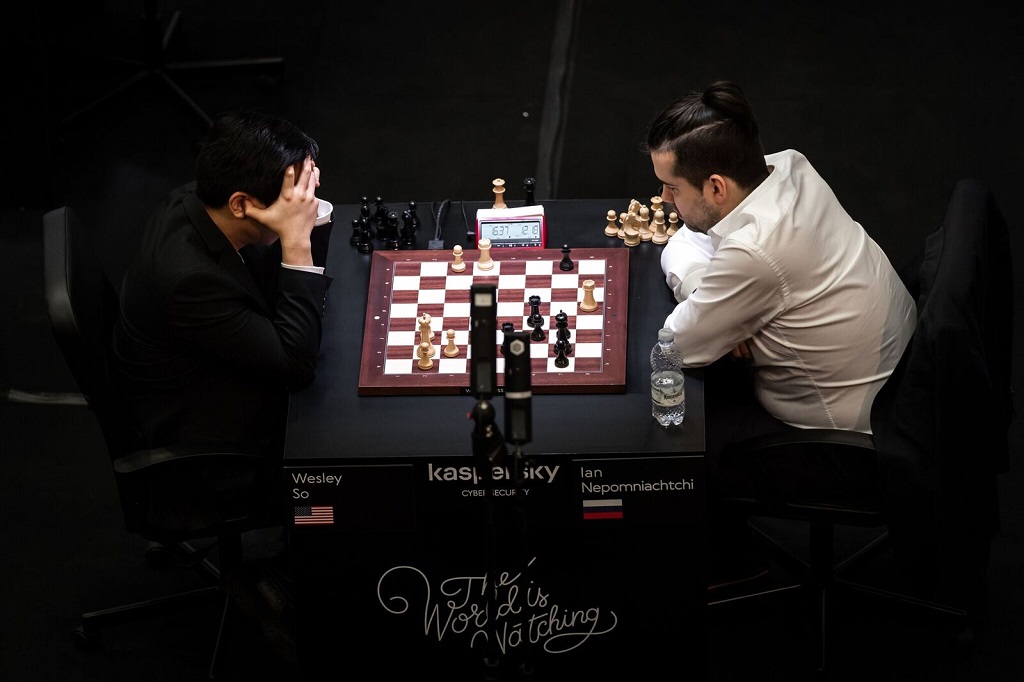
It was a tense-filled match-up — Wesley So v Ian Nepomniachtchi | Photo: Niki Riga
The Chinese prodigy kicked off the tiebreakers with White and, much like Andreikin, decided his best possible strategy was to deviate from well-known paths from the get go. After 1.e4 e5 2.d4 exd4 3.♕xd4 ♞c6 he continued with 4.♕c4, a move that had Svidler rethinking all he ever learned about chess.
Wei Yi's enterprising approach led to a wild fight and set the tone for the remainder of the match. It was particularly curious to see how the Chinese prodigy took his king to safety, first castling long and then transferring it to the kingside, in the midst of a board full of pieces:
In this DVD, Parimarjan Negi looks at the latest revolution in Scotch theory that has completely changed white’s plans, and once again brought back the interest of the world’s elite.
There followed 15.♔d2 d5 16.♗xf6 ♛xf6 17.♘d2 dxe4 18.fxe4. While Black's position might look better at first sight, the fact that his knight is totally out of play on a2 gives White compensation.
The young star handled the complications better than his opponent and ended up getting the full point after 38 moves.
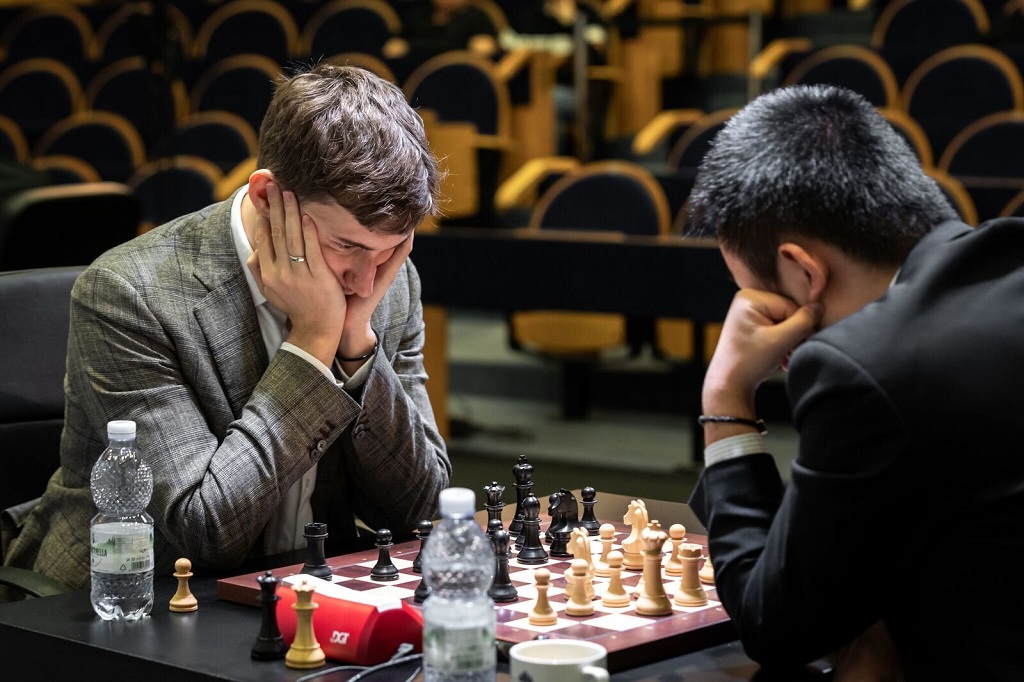
Sergey Karjakin was stopped by Wei Yi | Photo: Niki Riga
Karjakin is not one to give up easily though, and went on to even the score by prioritizing the initiative over material out of a Caro-Kann Defence.
Black has the bishop pair and two extra pawns, but his lack of development on the queenside and the weak light squares around his king are bigger factors in this case. Karjakin played 26.♕d3 and quickly won the game with an unstoppable attack.
Wei Yi had Black again in the first 10-minute encounter and once again opted for the Caro-Kann. A sharp early middlegame ensued, in which Karjakin showed great tactical alertness to get a clear edge. The Russian emerged a pawn to the good in an endgame with a rook and a minor piece per side.
The Fashionable Caro-Kann Vol.1 and 2
The Caro Kann is a very tricky opening. Black’s play is based on controlling and fighting for key light squares. It is a line which was very fashionable in late 90s and early 2000s due to the successes of greats like Karpov, Anand, Dreev etc. Recently due to strong engines lot of key developments have been made and some new lines have been introduced, while others have been refuted altogether. I have analyzed the new trends carefully and found some new ideas for Black.
Karjakin put all his hopes on the passed h-pawn, only to realize too late that Black had enough defensive resources to keep it from promoting. Wei Yi counterattacked in the centre and eventually got himself a strong passer. On move 53, he used a tactical shot to gain White's bishop:
After 53...g3 White has nothing better than 54.♗xg3, losing the bishop to 54...♜a3+. Four moves later, Karjakin accepted defeat.
A draw with White in the second 10-minute game gave Wei Yi the ticket to the semi-finals, where he will face David Navara.

Wei Yi on his way to the playing venue | Photo: Niki Riga
Official broadcast with GM Evgeny Miroshnichenko via worldchess.com
Previous reports: